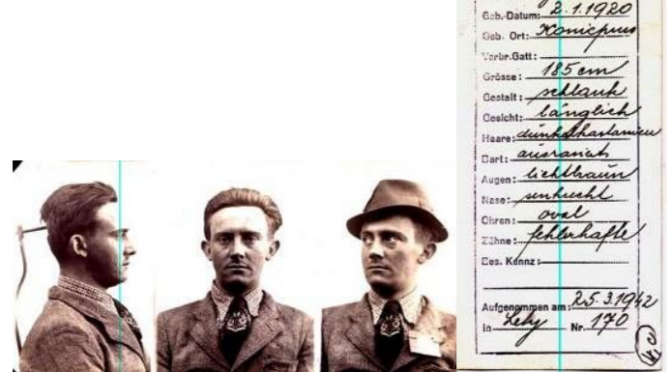VI. setkání Semináře CEFRESu 2021–2022
Biopolitika, prostor a úřednické poznatky ve 20. století z pohledu středovýchodní Evropy
Kdy: středa 8. prosince 2021, 16:30
Kde: v CEFRESu a online (Můžete se zapsat na adresu claire(@)cefres.cz)
Jazyk: anglicky
Promluví: Nikola Ludlová & Vojtěch Pojar, doktorandka a doktorand na CEU a v CEFRESu
Biopolitika, prostor a úřednické poznatky ve 20. století z pohledu středovýchodní Evropy
Naše setkání se skládá ze dvou prezentací na téma biopolitika ve středovýchodní Evropě. Důraz je kladen na vědecké znalosti, a jakou roli v jejich produkci a oběhu hrají úřední znalci a byrokracie. Na první pohled se naše prezentace mohou zdát nesourodé, jelikož se zaměřují na různé vědní disciplíny (demografii a eugeniku) a také na rozličné části dvacátého století. Nicméně, spočívají na třech sdílených předpokladech vycházejících z historie vědy. Rádi bychom je zde rozepsali.
Za prvé, věříme, že zde neexistuje nic takového jako volně „poletující“ vědecká znalost. Naopak si myslíme, že prostorové paradigma nám nabízí nástroje pro přesvědčivější analýzu. Zkoumáme tak vědecké poznatky v pohybu a studujeme jejich oběh v různých geografických a institucionálních kontextech.
Za druhé, se snažíme vysledovat stopy vědecké znalosti, které zasahují k různým praktikám tvorby znalostí. Zejména jsme si v průběhu našeho výzkumu oba uvědomili, že právě byrokracie hrála hlavní – a podceňovanou – roli při vytváření a šíření biopolitických znalostí. Sdílíme tedy nedávný postřeh Theodora Portera. Studie byrokratických znalostí ukazuje, že společenské vědy jsou „víceméně spojité s formami odbornosti, které vyrostly ve státních úřadech a reformních organizacích zahrnujících církev, právníky a lékaře, stejně tak jako vědce.“
Zatřetí, tvrdíme, že propojení vědeckých poznatků s byrokratickými praktikami nám pomáhá přehodnotit jak roli biopolitiky, tak byrokracie ve středovýchodní Evropě. Toto regionální pojetí však přináší i analytické výzvy, které jsou spojeny především s pojmem dis/kontinuita. Konvenční historické narativy představují dějiny států, jako je například Československo, jako sérii radikálních zlomů, které jsou spojeny s po sobě jdoucími změnami politických režimů. Nicméně, naše prezentace ukážou, že zaměření na vědecké poznatky, včetně znalostí formujících biopolitiku, odhaluje příběh, který je o něco složitější a znepokojivější.
Resumé jednotlivých prezentací
Individual and Collective Identification and Evidence of Roma in the Twentieth Century
Nikola Ludlová
Demography and its close associate statistics belong among the major intellectual and institutional offshoots of the modern European bureaucratic state whose further development continued to be tightly linked with state governance. The chapter focuses on ethnic statistics and evidence targeting Roma as cases of knowledge making most directly linked with state surveillance and management of Romani population. Population censuses and demographic surveys conducted by demographers, the ‘gypsy’ registers conducted by criminal bureaus and evidence pursued by national councils in the framework of social work generated data which circulated among these scientific and administrative institutional agents. Administrative bodies drew on primary demographic statistics and demographers used administrative data mostly as sources of secondary data, but also for comparative purposes, especially as concerns the data on the size of the Romani population. On account of the credence and authority attributed to these scientific and administrative ‘paper’ technologies, the politically constructed representation of Roma, presented as objective reflection of reality, had tangible mostly negative consequence for people subsumed under this category. Identification and evidence were indispensable to the realization of the racial policies of the Nazi Germany and analogically, the ability and sources to achieve erasure from the evidence and disguise one’s identity could save lives. Spanning the period of almost entire twentieth century, I trace dis/continuities in practices of identification, categorizations and evidence of the targeted objects across these specialized bureaucratic and scientific realms and embed the history of registration and personal identification practices by civil and security bureaucratic agents and by scientific experts, i.e. demographers, in a longer history of population identification and registration as instruments of governmentality indispensable to the projects of state and nation-building since the 19th century.
Eugenics in Post-Imperial Transitions: Concepts, Spaces and Practices
Vojtěch Pojar
My talk explores some consequences of the imperial turn in Habsburg studies for the history of eugenics in East Central Europe. To fully seize these opportunities, I argue, we need to move beyond the categories derived from the classical history of ideas. History of knowledge offers us more useful tools in this regard. I will spell out how a focus on concepts and their circulation, on spaces, and on practices may help bring empire into the history of eugenics in East Central Europe, and vice versa.
First, an analysis of concepts used by eugenicists in early twentieth century Austria-Hungary reveals how various actors drew on eugenics to think through their imperial situation, sometimes in startling ways. Moreover, conceptual history makes it possible to trace the continuities and reframing of such eugenic knowledge after the collapse of the empire and the emergence of its successor states. Second, I argue that a focus on the spaces in which these concepts circulated not only shows the transnational nature of eugenic knowledge, but also illuminates how it operated on multiple scales, local and global, national and imperial. Third, an analysis of practices and institutions in which eugenic knowledge was embedded opens up new possibilities for explaining its changes. How can we explain the rise of radical biopolitics in interwar post-Habsburg Central Europe remains the crucial question here. However, my talk will suggest how the perspective of imperial history and history of knowledge can help us answer this question in a more complex way.
Suggested Readings for both presentations
- Maria E. Kronfeldner, ‘“If There Is Nothing beyond the Organic…”: Heredity and Culture at the Boundaries of Anthropology in the Work of Alfred L. Kroeber’, NTM Zeitschrift für Geschichte der Wissenschaften, Technik und Medizin 17, no. 2 (May 2009): 107–33.
- Maurizio Meloni, ‘A Political Quadrant’, in Political Biology: Science and Social Values in Human Heredity from Eugenics to Epigenetics (Basingstoke; New York: Palgrave Macmillan, 2016), 93–135.
- Theodore M. Porter, ‘Revenge of the Humdrum: Bureaucracy as Profession and as a Site of Science’, Journal for the History of Knowledge 1, no. 1 (17 December 2020): 1–5.

